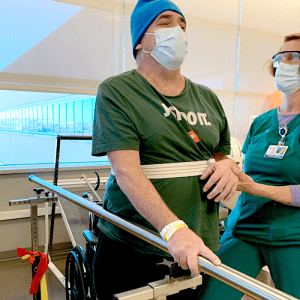 At Centre for Neuro Skills, returning patients to their highest level of skills is a priority. “We Are Innovative” is a company pillar, and the journey of attorney Skip Scott emerged (in legal parlance) as Exhibit A.
At Centre for Neuro Skills, returning patients to their highest level of skills is a priority. “We Are Innovative” is a company pillar, and the journey of attorney Skip Scott emerged (in legal parlance) as Exhibit A.
Skip practiced his courtroom eloquence in “Reconnecting the Dots,” a lecture and PowerPoint he developed and presented before a group of fellow patients at the CNS Dallas clinic, where he recovered from a brain tumor and stroke. His case manager, Diane Lokay-Nickell, facilitated the idea, which resonates with CNS’ tailored care approach.
“You have to do what inspires you,” Skip says of the lecture he crafted. “For me, it’s reconnecting with family, work, and biking. Once you know what your passion is, you must act on it with purpose.”
As an attorney, Skip wanted the presentation to replicate the challenges he faces in a courtroom. “I needed a real-world dynamic. I asked for distractions, questions, even a heckler,” he said. In a trial, he must know how to read a jury, so he requested an environment of divided attention - even loss of interest - to stay in command.
Skip was inspired by watching CNS therapists work with patients and took note when they had to pivot, try something new, or introduce a device that would strengthen a muscle or improve a skill.
While Skip has returned to his law practice, his CNS therapy continues to benefit him in the rigors of a trial. In a recent phone call, he heard resistance in a judge’s voice, meaning Skip had to change course on the spot. The PowerPoint was a memory tool that kept him on cue while the “jury” kept him on point.
“That’s what I saw therapists doing – isolating movements and homing in on skill sets.” Their approach inspired his approach in CNS “court.”
In every therapy, Skip noted, “CNS expands the envelop to fit the needs of each case. That speaks well of CNS because no injury is the same. For me, no case is the same.”
CNS Monthly Newsletter
The latest CNS updates, including events, company information, and patient care developments
The Inside View
Quarterly magazine focused on brain injury research, rehabilitation, and advancements shaping the field
Sign-up for one or both to stay connected with brain injury news and recover